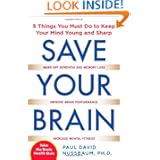Posts Tagged ‘happiness’
 “Learn healthy brain lifestyles.” ~ Doc Meek
“Learn healthy brain lifestyles.” ~ Doc Meek
A Proactive Program to Preserve Your Life Story
Your Brain Health Lifestyle – Paperback (Mar. 4, 2009) by Dr. Paul Nussbaum
TUESDAY, MARCH 22, 2011. Today I am grateful for Dr Paul Nussbaum, who is telling us that brain health needs attention to 5 major necessities:
PHYSICAL ACTIVITY
NUTRITION
SOCIALIZATION
MENTAL STIMULATION
SPIRITUALITY
Save Your Brain: The 5 Things You Must Do to Keep Your Mind Young and Sharp – Paperback (Mar. 19, 2010) by Paul Nussbaum
“I was interested to read in the Globe and Mail that people with advanced Parkinson’s cannot walk but can ride a bicycle. The brain is interesting.
“The book starts with a survey to see how good you are on brain stuff. It includes questions on exercise, diet etc. I was surprised I scored ‘poor.’ Perhaps that is partly because I am a tough self grader but partly because the questions did not allow me to use alternatives that I do that are likely comparable. EG – dancing once per week (which I do not do) is surely comparable to martial arts.
“Of course it has a technical section on how the brain works and what it is. And [a] part convincing me that I need to work on saving my brain.
“The 5 things to do to Save Your Brain:
1 – Socialize. Basic human interaction.
2 – Exercise. 25% of the blood circulation goes to support the brain.
3 – Mental Stimulation. Use it or lose it. Learn something new always. Challenge yourself.
4 – Spirituality. He includes “mental rest” in this category.
5 – Nutrition. The obvious – eat like your mom told you to and use supplements if you cannot. He is also a big advocate of fish oil.
“These are all obvious and not new. He did not emphasize the things not to do (like drugs, alcohol and boxing). It was a good reminder of things I already knew. ” – Jim Estill (New York)
 “Think Smart.” ~ Richard Restak, M.D.
“Think Smart.” ~ Richard Restak, M.D.
 |
| Formats | Buy new | New from | Used from | ||
|---|---|---|---|---|---|
|
Only 4 left in stock – order soon.
|
$16.00 | $6.40 | $3.13 | $2.49 | |
| Kindle Edition Auto-delivered wirelessly | $9.99 |
I had a boss who used to yell at us “If you don’t think too good don’t think too much”. Just like a Wall Street hero, no? Anyway, he couldn’t be more wrong. This fine book issues from many years of research to proclaim that we truly can become smarter at a profound yet practical level. We can dwarf the IQs so many of us were saddled with as children. There is nothing…
 “Music opens the channels of learning.” ~ Doc Meek
“Music opens the channels of learning.” ~ Doc Meek
15 minutes Catching Up With Rex by CBS 88,713 views
Images from: http://www.youtube.com/watch?v=cCF1xSgyKXg&feature=relmfu
Friday, March 18, 2011. Today I am grateful to know that a child who was labeled severely autistic was found later to respond to music, even though he was super senstive to sounds and would hold his ears when exposed to singing.
Of course every autistic child does not grow up to be a musical genius. That is not the point of this article.
I use music in my private practice (Baroque music, about 60 beats per minute) to help open the channels of learning for children with a large array of learning problems.
Sometimes the music is simply background music in a classroom that helps almost every child in that classroom to learn more easily and achieve more.
Thanks to those who know, and who have taught us, that music opens the mind and soul!
Doc Meek, Fri, Mar 18, 2011, Sherwood Park, Alberta, CANADA
P.S. Here’s the book about Rex Lewis-Clack by his mother Cathleen Lewis:

Rex: A Mother, Her Autistic Child, and the Music that Transformed Their Lives – Hardcover (Oct. 28, 2008) byCathleen Lewis
P.S.S. Somebody told me that it is the “Ides of March” today. I know the reference is to Shakespeare and I do not know the full import of the phrase.
Can anybody “out there” give us some more information on the “Ides of March?”
 “I love Irish music & dance.” ~ Doc Meek
“I love Irish music & dance.” ~ Doc Meek
Girls playing Irish folk music during a St Patrick’s Day parade in Dublin, 2010; image/caption from: http://en.wikipedia.org/wiki/Saint_Patrick’s_Day
Thursday, the 17th of Ireland, 2011. Today I’m feeling a great Irish sense of gratitude for me late fither [my Dad], James Collins Meek II, born in Belfast, Ireland, and after whom I was named. His name is one of my cherished Irish legacies. – James Collins Meek III (Doc Meek)

The Chicago River is dyed green each year for St Patrick’s Day celebration, shown here in 2005; image/caption from: http://en.wikipedia.org/wiki/Saint_Patrick’s_Day
Thank you Dad (James Collins Meek II) for my name and for my delightful Irish heritage!
Doc Meek (James Collins Meek III), Thurs, Mar 17, 2011, Sherwood Park, Alberta, CANADA
 “Learn reverse language.” ~ Doc Meek
“Learn reverse language.” ~ Doc Meek

Image from: http://www.flickr.com/photos/jabru/4549490/
Wednesday, March 16, 2011. Today I am grateful for the knowledge of the neurology of learning.
“Reverse” language is actually “forward” language, however everybody has to kind of reverse themselves to get the hang of it in ordinary daily speech.
When someone says they had a good day or a bad day, the brain makes a picture of a good day or a bad day.
This results in one more picture in the “yellow sunshine place” in the brain, or in the “black box,” depending upon whether the picture was a good one or a bad one.
We have enough pictures that are not good in the black box already. We don’t need any more!
Someone estimated that by the time a child reaches grade one, he has 100,000 not so good pictures in his black box, and only about 3,000 good pictures in his yellow sunshine place.
Not good odds eh? When your brain is reaching for a thought, what are the chances of getting one from the yellow sunshine place?
These stacked odds are in the brains of children from normal families, with no history of neglect or abuse! Imagine the odds if the child has been witness to not good pictures all his young life, and may have even been directly abused?
Not good.
On the other hand you can daily right the balance.
I used to teach parent and teacher classes. I would day to them, “Ask me what kind of a day I had yesterday, OK?”
Someone would always oblige and I would reply:
“Let me tell you, it was not one of my best days. Not good. Not pleasant. Not great.”
So they all knew that I had not had a good day.
However, from a neurological learning point of view, here is what is happening inside the brain:
The brain cannot do a “not” without first making a picture of what comes next. In my example, as you can see, what comes next in each case is positive word or phrase (“one of my best days,” “good,” pleasant,” and “great.”)
So the yellow sunshine place got 4 more good pictures, even though I was describing a day that was not good.
Pretty good for a day that was not what I had hoped for, eh? 😮
You can use “reverse” (actually “forward”) language like that as a matter of habit and you will be filling your yellow sunshine place to the brim over time. This will stack the odds in your favor tremendously when you reach for a thought! 😮
Thank you to whomever it was that realized that we can stack the odds in our favor, every day, simply by using “reverse” language! 😮
Doc Meek, Wed, Mar 16, 2011, Sherwood Park, Alberta, CANADA
 “Recipe for depression.” ~ Doc Meek
“Recipe for depression.” ~ Doc Meek
Image from: http://www.amazon.com/Happy-No-Reason-Steps-Inside/dp/B002RAR2OI/ref=sr_1_1?ie=UTF8&qid=1299910535&sr=8-1
Tuesday, March 15, 2011. Today I am grateful for a friend who questioned me about depression. I had sent him the following “Recipe for Depression” and he queried me on it.
Here is the exchange:
RECIPE FOR DEPRESSION:
(1) You notice that what is happening is what you want (you get your own way).
Result: You are happy.
(2) You notice that what is happening is what you don’t want (you don’t get your own way).
Result: You are not happy (you are depressed).
Since life does not always produce for you what you want, this is a guaranteed recipe for depression.
Solution?
Stop basing happiness on whether you get your own way or not.
My friend replied:
That sounds good, Collins, but it’s just so natural to live the way you describe. Any suggestions as to how to change that or deal with it?
So, I guess I’m saying… You’ve told me the “what.” Now, please tell me the “how.”
So I replied to my friend:
I read Marci Shimoff’s book entitled Happy for No Reason and that provided a real start for me. Many “how’s” I think.
Then I got a “gratitude rock” (a small pebble) which I carry in my pocket continuously. Every time I reach in my pocket and touch the little rock, I think of something for which I am grateful. Actually feel grateful for, not something I “should” feel grateful for. I have slowly, very slowly, transformed my mental life from one of very natural criticism and complaints to one a healthier set of feelings of gratitude. Real feelings.
Just as real as the feelings of depression that haunted me for so many years.
Love and Respect, Collins
Side-notes with respect to my friend’s statement: “. . . it’s just so natural to live the way you describe [recipe for depression].”
(1) Yes, in our Western culture we do tend to live that way. That is why depression is so rampant.
(2) My Christian friends tell me that I should not try to live as the “natural man,” that I should try to live as the “spiritual man.”
(3) Knowing that my friend is a professing Christian, I should ask him, “What sayest thou to that?”
P.S. One thing in Marci’s book that caught me square in the solar plexus was one man (one of her group of “The Happy Hundred”) who said (and lived it):
“I am grateful for everything. I have no complaints whatsoever!”
I was so stunned when I read this that I determined to learn how to live like that!
I still have a long ways to go. However, I am getting there and it is so satisfying I cannot express how much in words.
Doc Meek, Tues, Mar 15, 2011, Sherwood Park, Alberta, CANADA
 “Earth has shifted on its axis.” ~ Terrie Wurzbacher
“Earth has shifted on its axis.” ~ Terrie Wurzbacher

Image from: http://twitpic.com/48ngyf
Monday, March 14, 2011. Today I am grateful for Dr Terrie Wurzbacher, who points us to the fact that the Japanese are responding to this horrific disaster with dignity and honor. There is no looting or violence. Thank you, Terrie!
===========================================
THE WORLD HAS CHANGED
===========================================
Yes, the world has,indeed, changed this week – both
literally and figuratively.
The earth has shifted on its axis since the Earthquake
in Japan.
There’s been an impact on the United States from this
quake as you know – the tsunami hit Hawaii and California –
we are not separated from the rest of the world as we
sometimes believe or act.
How has your world and your view of the world changed
this week?
Or has it?
I hope it has.
If nothing else we should take many lessons from this
disaster. Sure, there are logistical lessons in the
disaster realm and there will be health lessons too.
These are important because, as we have learned in
recent years (especially after Hurricane Katrina) the
United States is not immune to such disaster.
But, what I’m talking about is the dignity and honor
with which the Japanese people are responding. Sure
they are “shell-shocked” but there is no looting nor
violence (and we certainly have enough video and
on site reporting that would let us know if there were).
What does that tell us about ourselves. It tells me I
am embarrassed that we behave this way in the US when
adversity hits. We pull out our guns instead of our
kindness and respect. We strike out with our fists and
nasty words, instead of embracing each other and reaching
out with open, not closed, hands.
What can you learn from all of this. Please do not turn a
blind eye to what’s going on. Can you even possibly imagine
watching the tsunami wash over your home and city right
before your eyes, realizing you only have what’s on your
body left – nothing else. Reach out to help others – donate
a few dollars, pray for them and even more importantly start
thanking the Universe for the wonderful things you have in
your life. Write in your gratitude journal and if you don’t
have one, go to http://www.GratitudeTracker.com . The more
positive thoughts and gratitude you send out to the Universe
right now will actually help the Japanese people and country
in ways you won’t even know.
Live your life today.
Be grateful for what you have right now.
Be kind to others. Reach out to others in whatever way you can.
Terrie
http://www.GettingUnstuckLLC.com
Getting Unstuck,LLC
‘..Practice What You Wish To Become’
http://www.gettingunstuckllc.com
14715 War Admiral
San Antonio, Tx 78248
540-287-8412
Thank you, Dr. Terrie Wurzbacher, for your kindness and insight and motivation for all of us in the face of any kind of disaster, national or personal!
Doc Meek, Monday, March 14, 2011, Sherwood Park, Alberta, CANADA
 “Work and laugh.” ~ Doc Meek
“Work and laugh.” ~ Doc Meek

Friday, March 11, 2011. Today I am grateful that I was able to work with a mother whose child has learning difficulties. We both worked hard and we enjoyed some humor along the way. Occasionally we laughed out loud. 😮
After I got home, I read a “Senior Citizen Joke” a friend sent me; I think he thinks I am a senior citizen, eh? 😮
This is the joke (a lady is speaking):
I have a new jigsaw puzzle, but I can’t figure out how to get it started. All the pieces look too much the same.
Her neighbor asks, “What is it supposed to be when it’s finished?”
The sweet old lady says, “According to the picture on the box, it’s a rooster.”
Her neighbor decides to go over and help with the puzzle.
She lets him in and shows him where she has the puzzle spread all over the table.
He studies the pieces for a moment, then looks at the box, then turns to her and says,
“First of all, no matter what we do, we’re not going to be able to assemble these pieces into anything resembling a rooster.”
He takes her hand and says, “Secondly, I want you to relax. Let’s have a nice cup of tea, and then,” he said with a deep sigh ………….
(scroll down)
.
.
.
Way to go, friend! 😮
Doc Meek, Fri, Mar 11, 2011, Sherwood Park, Alberta, CANADA
 “Learning scientifically.” ~ Doc Meek
“Learning scientifically.” ~ Doc Meek
Image from: http://en.wikipedia.org/wiki/Scientific_method
Thursday, March 10, 2011. Today I am grateful that we can be aware both “objectively” and “subjectively.”
This is not a “religious” blog per se, although “everything” is “religious” through a certain lens. Even atheistic scientists have their “religion”: unsupported beliefs which are clung to, and defended, with the same tenacity as a “religious” zealot. This scientific zeal is practiced by scientists all unaware usually.
Many scientists believe that they are totally “objective” in their scientific endeavors. Their “objective” view that they are totally objective is, in itself, subjective.
Scientists can hold to this belief in ther own objectivity with some degree of impunity, and perhaps even some degree of “infallibility,” when their efforts are directed towards things, towards objects if you like, and not people.
As soon as people become the focus, however, the concept of “objectivity” loses much, if not all, of its power.
Three examples:
(1) The “scientific” mythology of the single variable.
In the so-called “hard sciences,” single variables, and even clusters of variables, can be manipulated with some degreee of certainty. As soon as the focus is on people, however, the idea that a single chemical, a “pill” if you like, or a single set of processes will accurately achieve its purpose goes out the window, so to speak. People present such a startingly high array of variables that even the most seriously intended statistical regression analysis falls fall short of the mark.
(2) The “scientific” mythology of the placebo.
If I had a drug that worked with all groups of people with some degree of success, all the time, no matter what the problem, the drug would be considered to be “miraculous” and I would be famous. We have such a drug. It is scornfully called a placebo, something that doesn’t “really” help, and is “all in the mind.” Since everything, everything, is all in the mind (when it comes to humans), it isn’t prudent to dismiss something that works all of the time for some of the people regardless of the presenting difficulty. Is it?
Here’s the question: If the mind is so powerful that it can effect positive results for a percentage of the people in any group suffering from any malady, why aren’t we actively harnessing that great power, instead of scornfully treating it as if it were not “real?”
(3) The “scientific” mythology of the anecdote.
Sometimes when I am providing accounts to scientists of startling successes some of my clients achieve in solving one of their “unsolvable”or “incurable” problems, the scientists scorn my account by describing it as “only anecdotal evidence.” In other words, to them, it has no “scientific” value.
However, I would rather have a thousand anecdotes of success, a thousand case histories if you like, than a “scientific” study with 86 subjects, 67% of whom find success using a “scientifically” derived process. A thousand subjective anecdotes beats 67% of 86 (or 67% of 1,086) every time. Even a study with very large “n’s” does not defeat my 1,000 anecdotes, which, for the successful individual concerned in the anecdote, represents 100% success, every single time. Right?
It is more important that I find my own success, and the success of my clients, in “what works for that individual,” as opposed to a “scienfically-derived process” that works for some of the people some of the time.
If my child finds success, where s/he found failure before, then it matters not whether that success is “anecdotally-based” or “scientifically-based,” does it?
Besides, I have noticed that my scientific friends, when pointing out the success of their scientific methods, are very convinced by an anecdote of one person who found success using their method. 😮
Many thanks to scientists who don’t take themselves or their “science” too seriously!
Knowledge is where you find it, no matter the source or the method, eh? (Within reason. 😮 )
Doc Meek, Thurs, Mar 10, 2011, Sherwood Park, Alberta, CANADA
 “Fear helps, fear hurts.” ~ Doc Meek
“Fear helps, fear hurts.” ~ Doc Meek

Image from: http://www.newthoughtgeneration.com
Tuesday, March 8, 2011. Today I am grateful to know that fear can be a friend, as well as an enemy.
Fear experienced in a negative way can be terrifying, paralyzing.
Fear seen as a friend can be exciting, can motivate us to new heights of learning, going into familiar territory to become more of who we really are.
It’s not just about money. It is about self development, self actualization and self fulfillment, in any area of realizing our full potential.
Doc Meek, Tues, Mar 8 2011, Calgary, Alberta, CANADA














